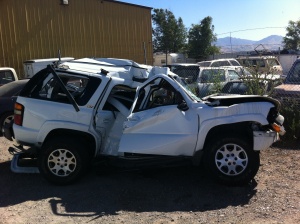 Donating an item, services, time and more in an effort to help others can be applauded, and of course, the idea that you’ll receive a tax break can be an appealing incentive.
Donating an item, services, time and more in an effort to help others can be applauded, and of course, the idea that you’ll receive a tax break can be an appealing incentive.
Unfortunately, donations are not always as cut and dry as billboards and television commercials make it seem. Although you would think a charitable donation would make financial sense, this is not often the case.
How do you determine whether to donate your vehicle or call a service that will offer you cash for your car? Keep a few critical pieces of information in mind.
Does your charity qualify as a 501(c)(3)?
If you don’t know, confirm it via the IRS’ website. (You could call them at (877) 829-5500, however, but you’ll likely be on hold for quite a while.)
1. You must itemize your deductions.
2. If you’ve always filed (or plan to continue to file) a 1040EZ, you cannot deduct any amount for your car.
3. Filing a regular, itemized 1040 tax form with the automobile being your sole deduction is accepted… Unfortunately, that’s typically not a great choice unless you’re a rare person who is dying to pay the IRS more than they must.
1. If a charity auctions your vehicle for a sum of $500 or less, you can claim either the fair market value, or $500… whichever amount ends up being less. Yep, you read that correctly: the lesser of the two numbers. (Ouch!)
2. The Charity plans to make use of your vehicle in its own work. (Example: delivering meals to the needy, shopping for the disabled, etc…)
3. The charity will be making material improvements to your vehicle in order to prolong its life. Minor repairs do not count —this basically means engine work, transmission work, and things along those lines.
4. The charity sells (or gifts) your vehicle to a needy person at a rate well below fair market value as part of their mission to help those in need of reliable transportation.
If you’re familiar with sites such as Kelly Blue Book, you’ve likely used their tool in an attempt to determine how much your car may be worth. The same premise applies here, however, you must describe the vehicle accurately.
You can’t claim your base model 1998 Audi A8 with 295,000 miles is the same as a fully loaded 2010 Audi A8 with 56,000 miles. Any comparison must be apples-to-apples.
In most cases, few of the cars picked up by these charities are suitable to give to the people they’re trying to help.
The CEO of 1.800.Charity.Cars told Edmunds.com, only about 5% of the vehicles they pick up actually go to their clients. What happens to the remaining cars? A hefty portion end up going straight to salvage (aka junkyards.) The others are sold at auction.
Although you can donate to charities as much as you want, the IRS does limit how much of those donations you can claim on your tax return. The magic number? Charitable donations cannot exceed 50% of your gross income.
At the end of the day, your car is not a dollar-for-dollar item. How much your taxes will benefit will depend entirely on your tax bracket. If you’re in the 15% tax bracket and donate a car that is only worth $1,000, your actual reduction in taxes is a whopping $150.
After reading the above, you may be realizing that a tax deductible donation is not the best way to go.
There are plenty of vehicle removal services that will buy your old car (this is especially true in the case of cars that no longer run) for cash. Some companies offer a $200 minimum, which, as you can see, may be of more help than $150 off your taxes.
If you’re interested in learning more cash for cars, give us a call —we’re happy to answer any questions you may have, or set up a time that's convenient for you to have us remove your old vehicle.